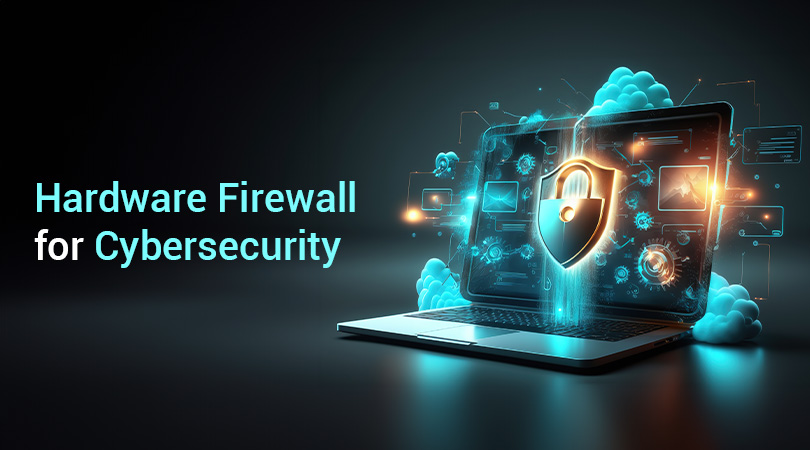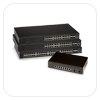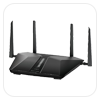
Today, the world is more globalized than ever, and being online is not just an option but a necessity for businesses. In India, online threats and cyberattacks are growing fast and changing all the time. Therefore, businesses can’t afford to be easy targets anymore. Some of the negative acts followed by cybercriminals are ransomware attacks, phishing attacks, and DDoS attacks. To navigate their way safely in this high-speed world, all Indian companies, regardless of their size or nature of operations, must put a strong focus on cybersecurity. Arguably, the most significant defense component to ensure thorough security is the requirement for a hardware firewall.
A firewall essentially acts as a strong gate, creating a border between the trusted internal network and the highly distrusted external networks (emerging primarily from the internet). It observes and limits incoming/outgoing network traffic according to the designed security rules, limiting the intrusion of harmful communication into the internal network. Software firewalls can provide protection at the endpoint level but might not be able to deliver a full-fledged, consistent, and resilient security that a hardware firewall has, particularly when interacting with the business’s networking environment.
Cyber Threat in India
It is a natural choice among cyber criminals as India is an emerging digital economy. Recent news reports indicate that India is one of the most-targeted nations in the world, so it is necessary to have a strong view towards cybersecurity. Indian businesses are confronted with a very broad array of security threats and are constantly evolving:
-
Ransomware Attacks:
Ransomware attacks are malicious attacks in which advanced AI-based methods are usually employed to avoid detection, data is encrypted, and attackers ask for enormous amounts of ransom for the data release.
-
Social Engineering and Phishing:
They are mind games; workers are tricked into disclosing information like passwords or money data, most likely leading to a breach of data and illegal entry.
-
Malware Attacks:
This includes malicious software, contrary to viruses, spyware, and trojans, which were employed to disrupt operations, steal information, or gain unauthorized access to systems.
-
Data Breach:
The unauthorized entry of sensitive information pertaining to personal and financial accounts offers a lot of money to the attackers and enormous losses and lawsuits to the victims, besides enormous reputational loss. In India’s largest breaches, hundreds of millions of records were stolen.
Advantages of Hardware Firewalls for Indian Businesses
With this challenging and high-risk threat environment, Indian companies need a strong and trustworthy security solution at the network edge. Hardware firewalls have some important advantages over software-based solutions, and they are therefore an essential part of a healthy cybersecurity stance:
-
Independent Security and Focus:
The hardware firewall is a stand-alone appliance with its own OS, focused entirely on the job of network security. Because it is independent, it becomes difficult to breach this appliance through attacks that would otherwise breach the operating system or applications on a server or an individual machine, where software firewalls are located.
-
Constant Protection from a Single Source:
In contrast to a software firewall, which must be loaded and set on every individual computer, a hardware firewall provides defense to the entire network and every device attached to it. Doing so simplifies management and ensures that all of the assets beyond the firewall experience the same defense.
-
Increased Performance and Throughput:
Hardware firewalls are designed to perform at high levels in network traffic inspection and filtering. They have their own processing power and optimized hardware that can process large volumes of data packets at a high rate of speed, without slowing down the performance of individual servers or workstations.
-
Tamper Resistance and Resilience:
The hardware firewall is separated from the rest of the networks. Hence, it is less likely to be tampered with by malicious actors. Due to their disabled status, security is high for the hardware that can be disabled if an endpoint is breached.
-
Network Segmentation:
The most advanced hardware firewall solutions provide network segmentation, which enables the company to divide the intranet network into separate zones. Thus, an intruder cannot traverse laterally through the network and execute the entire attack in case of a break-in, and attacks are restricted in their action radius and are unable to spread far-reaching harm.
-
Traffic Filtering:
Hypervisor-based and hardware firewall(s) are extremely manageable with granular rules for permitting or blocking incoming and outgoing traffic based on source IP address, destination IP address, port, protocol, and even application-layer content. This enables the accurate enforcement of access control policies and blocking data exfiltration.
-
Logging and Auditing:
The hardware firewall will offer logging and auditing functionality for tracking network activity and security events. These logs are of great use for security monitoring, security incident response, compliance, and audit.
Compliance and Regulatory Environment in India
The Indian government, aware of the utmost importance of digital security, has enacted a number of guidelines and regulations aimed at improving the digital security stance of companies. The Information Technology Act, 2000 (IT Act) and its amendments have established the legal framework for electronic transactions, data protection, and cybersecurity, and have levied penalties for its breach. The Digital Personal Data Protection Act, 2023, also details these requirements, laying out prescribed guidelines in the collection, processing, and storage of personal data.
Even though not mandating the installation of hardware firewalls, the regulations mentioned above state that companies will be required to implement “reasonable security practices and procedures” to safeguard sensitive data and make sure that networks are not vulnerable to cyberattacks. Indeed, a robust hardware firewall would be a fundamental component of such “reasonable security practices,” thereby being a minimum-security layer that companies can use to meet the compliance level and prevent rising legal or financial penalties.
Addressing Challenges in Implementation
Yet, while undoubtedly useful, hardware firewalls can actually present implementation and management issues to Indian companies, particularly the small and medium-sized ones:
-
Cost:
The amount of initial capital investment in a hardware firewall appliance might not be budget-friendly for a lot of companies. But then again, the cost of a cyberattack could ultimately prove much more unaffordable than that of defensive measures.
-
Complexity:
Setting up advanced hardware firewalls can be too difficult for some companies, especially if they don’t have skilled IT staff. While some devices simply require a short amount of time for setup. The majority of businesses would be better advised to seek out managed security service providers (MSSPs) for this.
-
Upkeep and Firmware Updates:
Maintenance, such as firmware updates and modifications to the set rules, needs to be periodically carried out in hardware firewalls to remain current with ever-evolving cyber threats. Companies either need to allocate some skilled people for this job or hire third-party assistance.
Best Practices of Cybersecurity for Indian Enterprises
A hardware firewall is an important process, yet it must only be a limited element of an expansive cybersecurity procedure, incorporating a myriad of good practices:
- Design a Comprehensive Cybersecurity Strategy: The strategy will consist of security objectives, recognize threats, establish policies and procedures, and outline resources necessary to maintain security.
- Establish Access Controls: Establish strong and different passwords, with multi-factor authentication (MFA) enforced for all important systems and accounts.
- Educate Employees: Conduct cyber-awareness training on a regular basis, where employees have been educated on phishing, social engineering, and other cyber threats.
- Patch Systems and Software: Ensure the frequent installation of patches and security updates on operating systems, applications, and firmware on all devices to remediate known vulnerabilities.
- Endpoint Security: Provide security from threats occurring within the locally operated region; this involves performing installations of antivirus and anti-malware across all endpoints.
- Define Incident Management Procedures: Determine response procedures for effective management and recovery from security incidents.
- Incident Response Monitoring: Watch for network traffic and review security logs for abnormal events.
- Perform Security Audits and Vulnerability Assessments on a Regular Basis: Regularly scan possible vulnerabilities in the security structure.
- Data Backup and Restore Policies: Periodic data backup should be performed with detailed step-by-step data restoration procedures to facilitate smooth business operations in case of loss of data.
Conclusion
To Indian businesses, cybersecurity is a problem confronting them dynamically and threateningly. A hardware firewall is therefore not a discretionary option for an Indian company, but rather a necessary one. It supplies that first-line defense wall: it delivers devoted, unflagging performance-directed protection against an array of clever cyberattacks. While the installation will be difficult, the devastating expenditures, in the form of finances, operational value, and reputation of a successful cyberattack, cannot be matched by the deployment and operating expenditures of an impenetrable hardware firewall. If the companies wish to enhance their resiliency, safeguard their precious assets, and develop into a safe place for sustainable growth in the digital age, then they need to implement a hardware firewall as part and parcel of an integrated security plan that entails best practices. Now is the time to invest in a robust network perimeter defense–not tomorrow!
















































































































